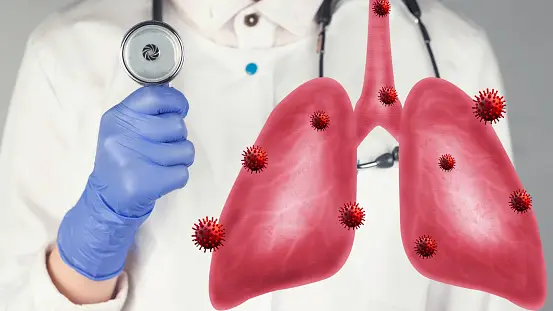Key Takeaways:
- The importance of maintaining lung health and common factors affecting it.
- Practical steps to improve and maintain lung health.
- Evidence and research support each tip for lung health improvement.
Why Lung Health Matters
Respiratory health is an essential part of overall health and wellness. Our lungs have a crucial function in respiration, helping with the transfer of oxygen and carbon dioxide, which is necessary for the body’s metabolism. Several factors can adversely affect lung health, including pollution, smoking, and exposure to harmful substances.
Continual exposure to air pollutants and cigarette smoke may result in the onset of long-term lung conditions like asthma, chronic bronchitis, and possibly lung cancer. These circumstances greatly reduce quality of life and can lead to death if not properly handled. Therefore, taking proactive steps to maintain healthy lungs is crucial for leading a longer, healthier life.
Clean Air, Clean Lungs
The lung health is directly influenced by the quality of the air that we inhale. Consulting a pulmonologist can help you understand and protect your lung health better. Poor air quality can trigger respiratory issues and exacerbate asthma and COPD (chronic obstructive pulmonary disease). Here are some practical tips to improve indoor air quality:
- Air purifiers remove pollutants from indoor air, such as dust, pollen, and pet dander. For the best results, look for cleaners with HEPA filters.
- Make sure to air out your home frequently by opening windows and utilizing exhaust fans. This aids in the flow of fresh air and decreases the level of indoor pollutants.
- Avoid using chemical-based cleaning products and opt for natural alternatives. Many household cleaners release volatile organic compounds (VOCs) that can aggravate respiratory issues.
Outdoor air pollution is another significant concern for lung health. To minimize exposure, consider the following measures:
- Stay indoors on days when the air quality index (AQI) indicates high pollution levels. You can check the AQI for your area through various apps and websites.
- If you must go outside during high pollution, wear a mask to filter out delicate particulate matter. This can help reduce the amount of harmful substances you inhale.
- Avoid spending time in high-traffic areas, where pollution levels are typically higher. Instead, walk or exercise in parks and open spaces away from busy roads.
Implementing these strategies can help protect your lungs from the detrimental effects of air pollution and contribute to better respiratory health.
The Role of Exercise in Lung Health
Regular physical activity is highly beneficial for lung function. Exercises such as walking, running, swimming, and cycling can enhance lung capacity and efficiency by strengthening the respiratory muscles and improving the cardiovascular system.
Types of Exercises Beneficial for Lungs:
- Aerobic exercise: Running, swimming, and cycling increase your heart and breathing rates, improving your cardiovascular health and lung capacity over time.
- Strength training: Exercises such as weight lifting and resistance training enhance muscle endurance and strength, reducing the strain on your lungs during physical activities.
- Breathing exercises: Techniques like pursed-lip and diaphragmatic breathing specifically target the respiratory muscles, aiding in better oxygen intake and promoting relaxation.
Studies have indicated that there is a connection between physical activity, enhanced lung function, and decreased chances of respiratory diseases. For instance, according to a study in the European Respiratory Journal, consistent physical activity can reduce the decrease in lung function that comes with getting older. Therefore, prioritizing physical activity is essential for maintaining healthy lungs and overall well-being.
Nutrition and Lung Health
A balanced diet is integral for lung health. Eating foods that are high in antioxidants, vitamins, and essential nutrients can assist in safeguarding your lungs from harm and promoting their peak performance.
Foods That Promote Lung Health:
- Fruits and vegetables Contain large quantities of vitamin C and E, powerful antioxidants that help reduce inflammation and protect lung tissue from oxidative damage.
- Fatty fish: Fatty fish like salmon, mackerel, and sardines are filled with omega-3 fatty acids, which have anti-inflammatory effects that can improve lung health.
- Nuts and seeds: Packed with essential nutrients like magnesium, nuts, and seeds support lung function by relaxing the airway muscles and improving breathing efficiency.
To learn more about the importance of a balanced diet for overall health, consider incorporating these nutritious foods into your daily meals. Healthy lungs and respiratory problems can be prevented by proper nutrition.
Avoiding Harmful Substances
Smoking and being around second-hand smoke are some of the most harmful influences on lung wellness. They can cause severe respiratory conditions such as chronic bronchitis, emphysema, and lung cancer. Additionally, second-hand smoke can harm non-smokers, especially children, and individuals with pre-existing respiratory conditions.
Steps to Quit Smoking:
- Seek support from friends, family, or support groups that can encourage and hold you accountable during your quitting journey.
- Think about utilizing nicotine replacement products like patches, gum, or lozenges to assist in handling cravings and withdrawal symptoms from nicotine.
- Consult healthcare providers for personalized quitting plans, including prescription medications, counseling, and other resources.
Learn about strategies for smoking cessation to improve your lung health and reduce the risk of developing severe respiratory conditions. Quitting smoking is one of the most impactful steps to protect your lungs and overall health.
Regular Health Check-ups
Regular appointments with healthcare professionals are crucial for detecting and treating lung diseases early. These visits can assist in tracking lung function, detecting potential problems early, and offering customized suggestions for keeping lungs healthy.
What to Expect During a Lung Health Check-up:
- Pulmonary function tests measure lung capacity, airflow, and gas exchange to assess lung function and detect abnormalities.
- Chest X-rays or CT scans: Imaging tests like chest X-rays or CT scans provide detailed visualizations of the lung structures and help identify issues such as infections, tumors, or other abnormalities.
- Review of medical history and lifestyle factors: Healthcare professionals will examine your medical history, current symptoms, and lifestyle choices (like smoking and physical activity) that could affect the health of your lungs during a check-up.
It is advisable to have lung health assessments done on a yearly basis, or more often if you have risk factors like smoking, a family history of lung disease, or chronic respiratory illnesses. Regular check-ups can help ensure early intervention and better management of potential lung issues.
Breathing Exercises and Techniques
Breathing exercises can significantly enhance lung function and efficiency. Regular practice can strengthen respiratory muscles, improve oxygen intake, and promote relaxation.
Simple Breathing Exercises:
- Pursed-lip breathing: Inhale through your nose for two counts, then breathe out slowly through pursed lips for a count of four. This method assists in reducing your breathing tempo and maintaining air passages open for a longer period, enabling an increased amount of air to flow through your lungs.
- Diaphragmatic breathing: Also known as “belly breathing,” this exercise focuses on deep breathing from the diaphragm rather than shallow chest breathing. Place one hand on your chest and the other on your abdomen. Take a deep breath in through your nostrils, letting your belly expand, and breathe out slowly through your mouth.
- Box breathing: Inhale for 4 seconds, hold, exhale, and hold for another 4 seconds. This technique can help regulate your breathing pattern and reduce stress.
Research supports the effectiveness of these exercises in improving lung function and overall respiratory health. Adding breathing exercises to your everyday schedule can boost lung capacity, decrease stress, and encourage relaxation.
Personal Stories and Real-life Examples
Real-life examples can provide inspiration and tangible proof of lung health benefits. Here are a few success stories:
Susan’s Story: After years of smoking, Susan decided to quit and started incorporating breathing exercises into her routine. Within months, her lung capacity improved, and she felt more energetic. She noticed a significant reduction in respiratory symptoms and could engage in physical activities without feeling short of breath.
John’s Journey: Diagnosed with asthma, John began regular workouts and focused on a healthy diet of antioxidants. His asthma symptoms reduced significantly, and he now leads an active lifestyle. Through a combination of a healthy diet and regular exercise, John has successfully controlled his asthma and improved his quality of life.
Conclusion
In summary, taking proactive steps to maintain lung health is essential for overall well-being. You can ensure your lungs stay healthy by focusing on clean air, regular exercise, a nutritious diet, avoiding harmful substances, and regular check-ups. Embrace these habits and witness significant improvements in your lung function and quality of life. Don’t forget, your lungs are crucial for your overall well-being, so make sure to prioritize their care.





